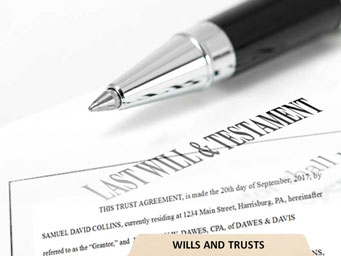Wills | Trusts | Power Of Attorney
Wills – Trusts – Power of Attorney (“POA”): three fundamental Estate Planning documents. Included for consideration is an Advance Directive or Living Will, which serves essential functions as well. An attorney can properly guide the details of each person’s Wills – Trusts – Power of Attorney documents.
Last Will and Testament
A Will or Testament is a legal document by which a person, called the “Testator” or “Testatrix” expresses their wishes regarding the distribution of their property upon their death. A Will also names one or more persons as “Executor” or “Executrix,” to manage the estate.
Drafting a Last Will and Testament serves an essential role in cases where a Testator seeks to distribute certain property, or certain amounts of their property, to certain people. Without a Will, the state intestacy laws dictate how the property gets distributed. Pennsylvania’s intestacy rules follow common sense, distributing property to the decendent’s surviving spouse, children, parents, siblings, etc., in order of priority.
Frequently, a Testator’s wishes follow the intestacy rules exactly. However, there are additional provisions within a Will that provide benefit to the estate. The provisions in a Will should eliminate the cost of potentially posting bond with the Court. It also identifies an Executor, and can manage funeral costs. A Will can also include limiting provisions for the resale of specific property to, “only as necessary.”
Trusts
Establishing a trust creates a fiduciary relationship between a person or party where, the first party, called a “settlor,” “grantor” or “trustor,” gives another party, called a “trustee,” the right to hold title to property or assets for the benefit of a third party, called a “beneficiary.” Trusts are frequently used in instances where a beneficiary is a minor. Testamentary Trust provisions included in a Will apply in a case where the Testator dies leaving minor children. In other circumstances, Trusts work in relation with various tax incentives or to accommodate special needs.
Power of Attorney
The Power of Attorney document (“POA”) is executed by an individual, or “Principal,” who appoints another individual, or “Agent,” to act on the Principal’s behalf. The POA can grant specific or general authority to an Agent. Examples might include: managing finances, business matters or handling other concerns for the Principal. Most importantly, the Agent has a “fiduciary” obligation to the Principal, performing actions that serve the Principal’s interests.
The POA is often a topic of discussion in “worst case scenarios,” where an Agent abuses his/her authority for the Agent’s advantage. Although these situations do exist, the POA has proven to be a very effective and extremely useful document throughout history. In truth, the POA properly serves the Principal’s needs in the vast majority of instances. The Agent is usually a close friend or family member who uses the POA with the Principal’s best interests in mind.
In contrast to the worst case scenarios, a POA has a tremendous upside. The POA can avoid the enormous costs of determining an individual’s capacity, as well as save the additional and considerable fees and expenses involved in appointing a Guardian or Custodian for the individual’s needs.
Finally, certain provisions placed into your POA serve to prevent misuse. Some examples include reporting requirements by the Agent to third parties. Other provisions place limitations or bans on gifts, loans, or other transfers. To assist in POA compliance, Pennsylvania established an Elder Law Task Force, as a resource for concerns of POA misuse.
For assistance in drafting Wills – Trusts – Power of Attorney, feel free to contact Goldberger Legal.
Wills – Trusts – Power of Attorney
Date:
August 20, 2017
Category:
Attorney Services
